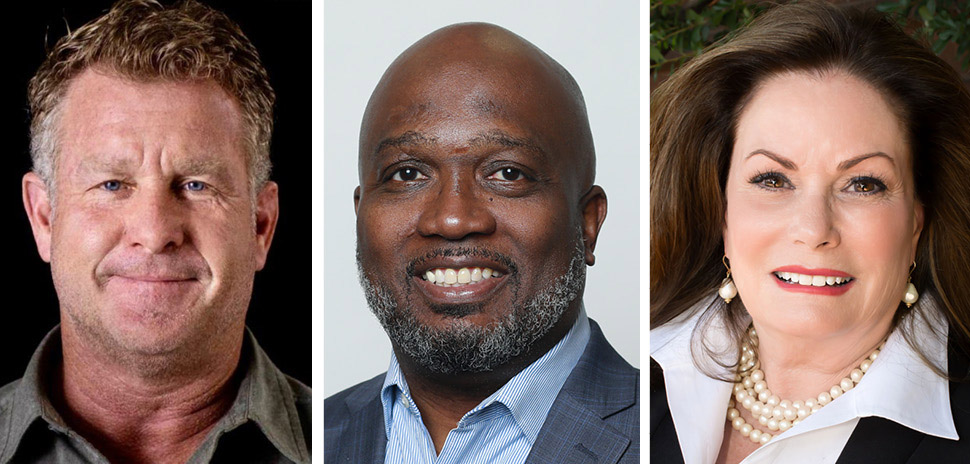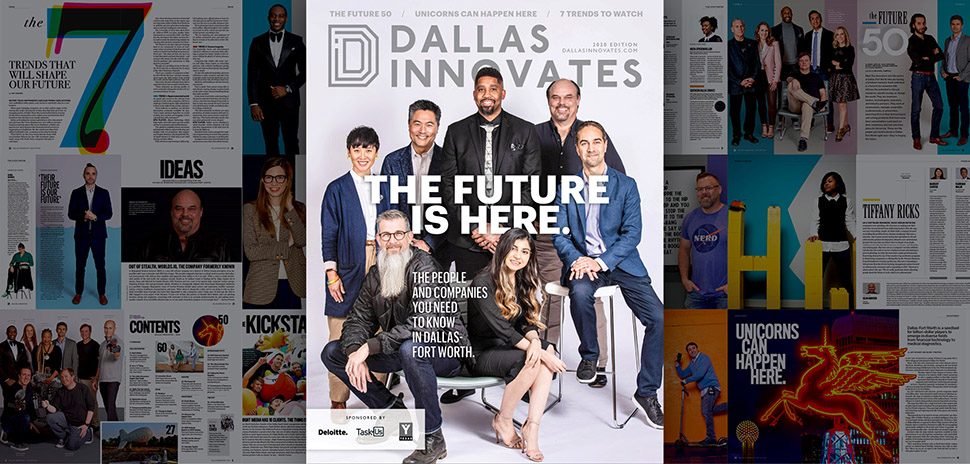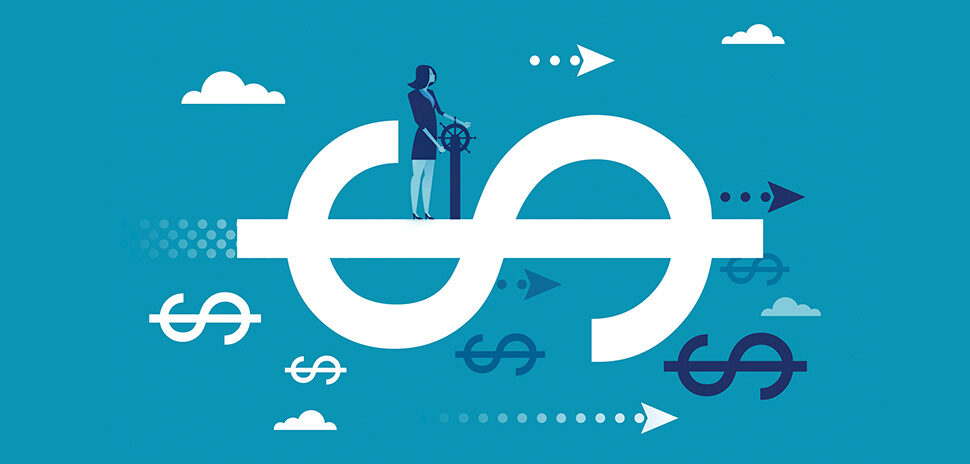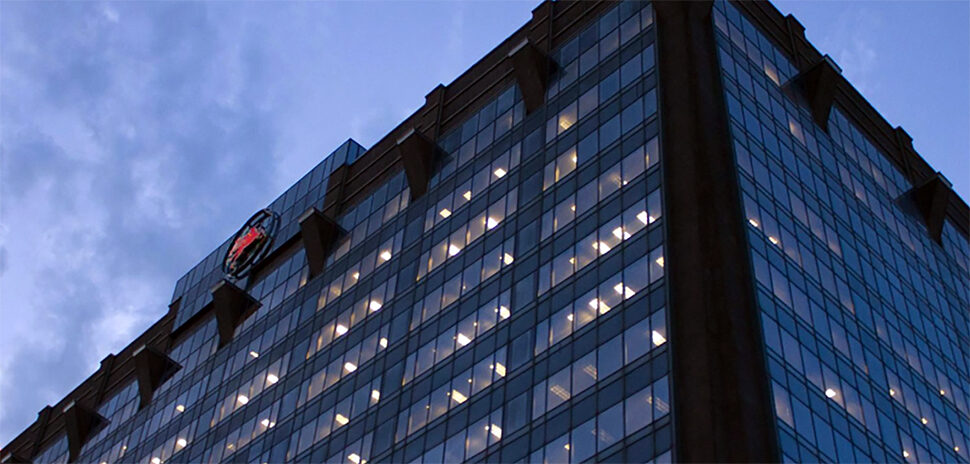![]() Communities thrive when individuals have access to healthy food, livable wages and housing stability, but in Dallas, accessible resources are often scarce in the city’s most Southern neighborhoods.
Communities thrive when individuals have access to healthy food, livable wages and housing stability, but in Dallas, accessible resources are often scarce in the city’s most Southern neighborhoods.
Compared to Dallas County as a whole, Southern Dallas has the highest rate of almost every chronic disease such as asthma, heart disease, and obesity. To help advance well-being for the city’s most vulnerable, nonprofits, civic leaders and businesses are collaborating to drive change.
Meet the organizations
Bonton Farms, represented by founder and CEO Daron Babcock, started as a garden in a small lot and has grown to two farms, a Farmer’s Market, cafe and coffee house. In the middle of the southern Dallas food desert, Bonton Farms provides easy access to fresh produce. The organization also offers nutritional counseling, cooking classes, a rent-to-own housing program, financial education, career mentorship, a charter school, and job skills training for adults. The goal of Bonton Farms is to disrupt systems of inequity to lay a foundation where change yields health, wholeness, and opportunity for the Bonton community.
Harmony CDC, which stands for Community Development Corporation and is represented by Executive Director Mark Porter, has served the southern Dallas area since 2001 with a mission of “strengthening families and revitalizing neighborhoods.” The organization helps clients with basic needs like food, housing, childcare, and transportation while helping them learn budgeting and wealth-building skills for long-term financial stability.
TREC Community Investors — a philanthropic arm of TREC, a membership organization with over 2,000 members in the North Texas real estate industry — joins forces with underserved communities to invest in those with little or no access to resources, energizing neighborhoods and individuals. Through access to flexible capital and real estate expertise, the organization’s members seek a lasting impact in the communities they serve.
We asked the representatives of these partner organizations to share the challenges and opportunities they see as they serve Southern Dallas communities today.
What are the biggest barriers facing Southern Dallas residents right now?
Harmony CDC: The biggest barrier is the rising cost of housing. We typically advise that housing costs should not exceed 30% of household income. However, many families are dealing with housing cost burdens, struggling with housing instability, rising cost of rent and facing evictions. Additionally, many are dealing with a stagnant income and lacking livable wages or family-sustaining wages. In partnership with United Way, MDHA, and the City of Dallas, Harmony is on the front lines assisting these families with providing rental, mortgage and utility assistance and offering case management. One of the common themes we observed with our clients is that they often do not have equitable family-sustaining wages, savings or financial resiliency. We must work collectively to invest money, remove these barriers and provide resources and training.
Bonton Farms: In the short term, the pandemic created a tremendous disruption. Food insecurity is severe. Jobs and/or working hours were lost. Eviction halts and municipalities pausing utility bills allowed many of our families to hold extra cash during uncertain times or to spend it on more pressing needs, like food. Those halts are now being lifted and many families are facing eviction and/or huge utility bills that threaten to cut off water and electricity. Inflation exacerbates this problem and jeopardizes even more families. Housing costs are significantly outpacing wage increases and are accelerating gentrification as middle-class families are looking to the inner-city for housing stock.
For the long-standing barriers, the biggest problem we see at Bonton is a narrative where people are perceived as the problem. Today, many Americans are born, no fault of their own, into a place of poverty that was designed to separate people from communities of affluence and of the resources those communities use to build lives with. Until we find right-sized, innovative solutions that equip our inner-city communities with the essential tools people use to build their lives with, we will continue to suffer from leaving far too many people behind and then spend significantly more money caring for them.
TREC: Southern Dallas is an infrastructure desert, it is a food desert and it does not have good options for transportation that allow residents to get to jobs easily. Most access to employment requires access to transportation, which is not necessarily designed to get people to job centers in an efficient manner. The infrastructure is crumbling or nonexistent and residents do not have reliable broadband connectivity. Lastly, given the recent pandemic – the growing homeless population is not being addressed so encampments are popping up.
What’s the biggest value or solution you offer your clients?
Bonton Farms: We believe that people have what it takes to change their lives. That means we listen to those closest to the problem to define the root cause issues and to identify the barriers. Then, we collaborate to create the “right sized” and scalable solutions that replace the existing barriers with effective tools. This process instills individuals with hope and helps them tackle one barrier at a time.. Everything is built on the foundation of the Social Determinants of Health & Wellbeing and immersed in a culture of Trauma Informed Care.
We provide a comprehensive set of tools to everyone, so each person has the tools to build their own lives. Our job is to walk alongside them on their journey, not to “fix” them.
We innovate solutions to root cause issues that use philanthropy to build, but we don’t create cost centers. Each solution must be able to support itself. If it doesn’t, we must keep innovating until we have a plan that will. Ultimately, we want future generations not to need us.
Harmony CDC: The biggest value to our Harmony clients is our holistic focus on providing barrier removal and wraparound services and offering educational pathways to self-sufficiency and wholeness. Through our integrated service delivery model, we offer a one-stop shop for direct programs, services, and resources. In addition, on our Harmony campus, we have co-locating nonprofit partners including Legal Aid of Northwest Texas which offers free civil legal help to low-income residents and Family Care Connection which provides family and parenting classes and services.
Through our economic mobility strategy, we provide access to our Financial and Career Pathway programs through our in-person and virtual programs. The Career Pathway Program is centered around self-sufficiency designed to equip individuals to obtain jobs leading to family-sustainable wages, economic mobility and address barriers keeping individuals from getting and retaining meaningful employment. Harmony’s Financial Pathway helps people live empowered through financial freedom, homeownership and upward economic mobility. The Financial Pathway program teaches individuals to budget, assists with credit repair and building, sets up checking and savings accounts, provides matching dollar incentives and teaches about predatory payday loan lending.
TREC: TREC Community Investors is an innovative organization dedicated to equitable development and neighborhood revitalization in Dallas and Collin counties, a unique resource that empowers communities through an unrivaled combination of assets: financial capital, world-class expertise, targeted education, and a passion for making a difference in our city, and a trusted partner with the experience to help rejuvenate local economies, increase essential services, create jobs, expand affordable housing, and transform underserved areas into vibrant, thriving communities.
We also utilize our members to provide professional commercial real estate services to these communities, helping them in rebuilding their community into a vibrant and safe space. We offer educational programs for individuals and organizations that want to expand their real estate knowledge, including Real Estate Boot Camp and Real Estate 101 for Nonprofits. Real Estate Boot Camp targets aspiring real estate developers of color and organizations seeking a Community Investors loan. It’s a one-of-a-kind, four-part course that dives into the development process with a goal of teaching the skills and knowledge necessary for aspiring community developers to begin bringing real estate projects to life that create positive local impact. Real Estate 101 for Nonprofits is for nonprofit leaders and board members responsible for making real estate decisions. Offered annually, the five-part course is designed to educate top decision-makers about the nuances of the real estate development process as it relates to their nonprofits.
Can you give examples of how you’ve had a positive impact in Southern Dallas?
TREC: The Dallas Catalyst Project (DCP) began in 2018 as a neighborhood revitalization initiative between TREC Community Investors and three nonprofit collaborative partners: St. Philip’s School & Community Center, Cornerstone Baptist Church, and ForestForward, which focuses on making a difference in South Dallas’ Forest District. TREC members provide expertise to redevelop commercial buildings and build housing by providing project management, pro bono professional services, technical assistance, funding and assistance with governmental entities that impact development. The project promotes equitable development with the goals of improving quality of life for residents, increasing job preparedness and wealth creation opportunities, enhancing safety and infrastructure, and supporting mixed-income and affordable housing.
TREC Community Investors’ has brought funding to the community given TREC members’ engagement and support of projects. We brought access to healthy fresh food through support of the development of Southpoint Market, and the addition of a laundromat to the community, which had not had a laundromat for over 10 years. Additional commercial development that is currently in process will provide jobs and the ability for food entrepreneurs to develop their businesses through access to a commercial kitchen. These are just a few of the projects that are transforming the Forest District. In the coming months – when you drive down Martin Luther King Boulevard – you will see the Block by Block transformation.
Bonton Farms: In 2023, we will open a 10,000-square-foot wellness center that will be home to medical care, mental health services and health programming, in addition to being home to the financial resource center.
We’ve also innovated several different types of affordable housing solutions that were previously not allowed in Dallas. Pallet Shelters, Tiny Homes, and a very unique and powerful triplex that provides safe places for people just starting out that will accelerate homeownership and wealth building.
Our social enterprises have created about 60 full-time jobs. We also have helped launch eight small businesses that are owned and operated by people who have successfully completed our program.
Harmony CDC: The Financial Pathway program has helped our clients gain a sense of financial stability. They have a deeper understanding of how finances work and how they can be in control of their money management. In the first year of the Financial Pathway program, our clients have applied the concepts learned in our cohorts and eliminated over $80,000 in debt, saved almost $65,000, and have reported quarterly increases in credit scores. Through ongoing support and community partners, our clients receive extended services that lead to homeownership, decreased debt, opened savings accounts and increased confidence in financial decision making.
What are your organization’s most critical needs right now and how can individuals and the business community help?
TREC: Our most critical need right now is funding and investment to continue our work within the community, as well as more businesspeople who want to make an impact in our city through donating their professional skills for these transformational projects. Learn more about our work at treccommunityinvestors.org
Bonton Farms: We need stakeholders from the business community to help solve problems at the root cause level. It is our strong belief that the business community has the right intellectual capital and resources to permanently remove many barriers that cause so many to become vulnerable in the first place. Individuals can sign up to become a monthly donor through our “friends of the farm” program and share our story with their networks.
Harmony CDC: One of our biggest needs is securing additional funding that would allow Harmony to increase our service capacity and impact in our community. Attaining more case managers and barrier removal funds are critical to our growth. Our second greatest need is volunteers for Financial and Career Pathways. We seek to provide 1:1 coaching and mentoring to our clients, and we need more volunteers in these areas to maintain this ratio successfully and eliminate burnout. We continue to need volunteers with our food pantry and financial assistance programs. You can learn more about our volunteer opportunities at HarmonyCDC.org.
Q&A edited for brevity and clarity.
A vibrant community requires an ecosystem of people, businesses and nonprofit partners coming together. Through the Capital One Impact Initiative we are listening to, partnering with, and investing in small businesses and nonprofits to close gaps in equity and opportunity and foster well-being in our communities where we live and work. Read more about our commitments.
Capital One is a Dallas Innovates Platinum partner. “How 3 Nonprofit Leaders Are Closing Equity Gaps in Southern Dallas” was written and edited by the DI content studio.
![]()
Get on the list.
Dallas Innovates, every day.
Sign up to keep your eye on what’s new and next in Dallas-Fort Worth, every day.

























